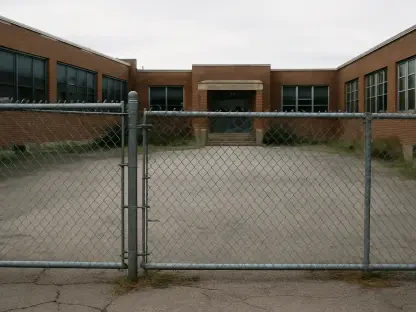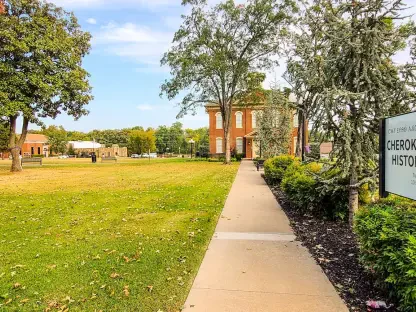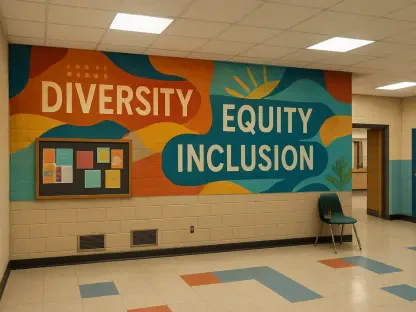Waukesha East High School, an alternative high school serving students in grades nine through twelve, has introduced an unconventional curriculum focused on project-based and personalized learning. This approach has significantly improved key metrics such as graduation rates and attendance, demonstrating its efficacy in providing a more engaging and effective educational experience. The school’s success is highlighted through significant improvements in graduation rates and attendance as well as positive student testimonials. Principal Susan Poppe attributes these strides to the introduction of a curriculum emphasizing real-life problem-solving, mastery-based grading, and a supportive and inclusive school culture.
Improvement Metrics
Before delving into the curriculum’s components, it’s important to understand the tangible outcomes of Waukesha East’s novel approach. Within a short period, the school has seen its graduation rate increase from 80.8% for the class of 2022 to 92.8% for the class of 2024. Attendance has also leaped from 56.8% in the 2020-21 school year to an impressive 87.7% in the 2024-25 school year. These statistics underscore the efficacy of the project-based and personalized learning model. Principal Susan Poppe notes that these metrics reflect not just academic success but also student engagement and school satisfaction. According to Poppe, the improvement in both attendance and graduation rates is a testament to the effective overhaul of the school’s educational approach, which prioritizes student involvement and practical learning techniques.
The rising attendance rates indicate that students are more eager to participate in school, which, in turn, has contributed to higher graduation rates. This shift is particularly noteworthy in an alternative school setting, where students typically face additional challenges. Parents and educators alike have expressed optimism and satisfaction with these advancements, attributing them to the school’s supportive culture and innovative curriculum. Their positive feedback highlights the success of Waukesha East’s efforts and underscores the importance of integrating real-world problem-solving approaches into the educational framework. Such strategies ensure that students are better prepared for post-high school life and the challenges they may encounter in their careers and daily lives.
Curriculum Design and Implementation
Waukesha East’s curriculum is designed around project-based learning (PBL) and personalized learning plans (PLPs). The school day begins with a 2½-hour morning seminar aimed at deep dives into subjects and projects, followed by a traditional math class. After lunch, students participate in an advisory period known as “crew” to hone soft skills such as communication and social skills. The afternoon is dedicated to workshops that support hands-on learning and real-life applications. The school week runs from 8:15 a.m. to 2:30 p.m. Monday through Thursday, and from 8:15 a.m. to noon on Friday.
This structured approach ensures that students remain engaged throughout the day while allowing for flexibility and creativity in how they learn. The morning seminars provide focused time for immersive learning, encouraging students to explore subjects in depth and complete complex projects. The traditional math class offers a necessary complement, ensuring students maintain competence in essential academic areas. The inclusion of an advisory period like “crew” emphasizes the importance of social and emotional skills, which are vital for personal development and future professional success.
Workshops in the afternoon enable students to apply what they’ve learned in real-world settings, reinforcing practical knowledge and skills. The varied weekly schedule also supports student well-being, reducing burnout and promoting sustained enthusiasm for learning. By integrating PBL and PLPs, Waukesha East’s curriculum addresses the diverse learning preferences of its students, creating a dynamic and inclusive educational environment. This combination of structured and flexible learning methods underscores the school’s commitment to fostering not just academic excellence, but also personal growth and real-world readiness.
Defining ‘Alternative’
Waukesha East has successfully redefined the perception of an “alternative school,” historically seen in a negative light. Principal Poppe highlights that the term ‘alternative’ does not reflect poorly on the students but rather indicates a different preference in learning style—one that avoids the traditional hour-long, textbook-bound classes. The school’s model is particularly focused on real-life, application-based learning, making education more relevant and engaging for students. This redefinition helps eliminate stigmas and encourages students to take pride in their unique educational path.
One of the most significant aspects of Waukesha East’s approach is its emphasis on creating a supportive and inclusive school culture. By focusing on real-life applications and problem-solving exercises, the curriculum aligns with the students’ interests and future aspirations, making learning both enjoyable and meaningful. The school’s environment also fosters collaboration and mutual support among students, enhancing their social skills and emotional well-being. This shift away from traditional methods benefits students who may struggle in more conventional settings by offering them an educational experience tailored to their needs and strengths.
The school’s positive results and student testimonials further illustrate how an alternative education model can be both effective and empowering. As students gain confidence in their abilities and see the relevance of their studies to the real world, they become more invested in their learning journey. Waukesha East’s success with this redefined “alternative” approach serves as a powerful example of how educational institutions can innovate to better meet the diverse needs of their students, ultimately leading to improved outcomes and higher levels of student satisfaction.
Project-Based Learning Model
The core of Waukesha East’s educational method is its project-based learning model, which fosters active investigation and hands-on engagement. This strategy builds student capacity to tackle real-world problems in a collaborative environment. Students follow a structured process: they identify problems, seek solutions, develop prototypes, and refine these solutions based on feedback from experts, instructors, and peers. This framework not only enhances critical thinking and problem-solving skills but also prepares students for the multifaceted challenges they will face in their future careers.
The PBL model employed at Waukesha East is particularly effective in making learning more engaging and relevant. By working on projects that have real-world implications, students can see the direct application of their studies, which motivates them to delve deeper into their subjects. Additionally, the collaborative aspect of PBL encourages teamwork and communication, essential skills in any professional environment. Students learn to negotiate ideas, manage group dynamics, and present their findings—all invaluable experiences that prepare them for life beyond the classroom.
Moreover, the iterative process of developing and refining solutions teaches students resilience and adaptability. They become accustomed to receiving constructive criticism and using it to improve their work, which is a crucial skill in any field. This cycle of feedback and improvement mirrors the processes found in professional environments, providing students with a realistic and practical understanding of how to manage projects and tasks. Waukesha East’s emphasis on PBL thus equips students with the tools they need to succeed in both their academic and future professional endeavors.
Mastery Learning Targets
To gauge student readiness for graduation, the school utilizes mastery learning targets that are a collection of related skills designed to measure progress on a six-point scale. The highest levels represent college-ready or college-level work. These targets guide the seminars and workshops, integrating core subjects such as English and math with essential life skills like decision-making, written communication in the workplace, and social interaction. This comprehensive approach ensures that students are not only academically prepared but also equipped with the practical skills needed to navigate adult life.
Mastery learning targets offer a more personalized and accurate assessment of student abilities than traditional grading systems. Instead of focusing solely on test scores or the completion of assignments, mastery targets evaluate a student’s understanding and application of skills in various contexts. This method allows for a more nuanced view of student progress and helps educators identify areas where additional support may be needed. The six-point scale provides clear benchmarks for students to aim for, making expectations transparent and achievable.
By integrating both academic and life skills into the mastery targets, Waukesha East ensures that students receive a well-rounded education. The focus on decision-making and communication, for instance, prepares students for real-world scenarios they will encounter in their personal and professional lives. This holistic approach not only boosts academic performance but also fosters the development of capable, confident individuals ready to face the challenges of the future. The success of this model highlights the importance of moving beyond traditional educational metrics to provide a more comprehensive and meaningful learning experience.
Personalized Learning Plans
Each student works with a personalized learning plan to track their progress, reflect on their goals, and prepare for post-high school life. This focus on individual pacing means that students can master skills at their own speed rather than conforming to the constraints of a traditional, time-bound curriculum. When students master a target or skill, they earn academic credit proportional to their comprehension and ability. This system allows students to have a more customized and flexible educational experience, aligning with their strengths and interests.
Personalized learning plans (PLPs) at Waukesha East ensure that each student receives the attention and resources they need to succeed. These plans are developed in collaboration with teachers, advisors, and the students themselves, fostering a sense of ownership and responsibility over their learning journey. The individualized approach also helps to reduce stress and anxiety, as students are given the time and support necessary to fully understand and master each concept. This tailored method caters to diverse learning styles, ensuring that every student has the opportunity to thrive.
The PLPs also play a crucial role in preparing students for life after high school. By setting and reflecting on personal goals, students develop a clear vision of their future aspirations and the steps needed to achieve them. This process instills valuable skills such as self-assessment, goal-setting, and strategic planning, which are essential for success in both higher education and the workforce. Waukesha East’s commitment to personalized learning demonstrates how education can be adapted to meet the unique needs of each student, ultimately fostering a more effective and meaningful educational experience.
Graduation Program Options
Students at Waukesha East have three graduation programs to choose from, providing additional flexibility to match their individual needs and goals. One program measures proficiency in core subjects. Another is a competency-based half-day program where senior students balance class attendance with work experience. The third option allows students to extend their high school tenure to recuperate lost credits and meet graduation requirements at their own pace. These varied pathways ensure that every student has the opportunity to graduate on terms that best suit their educational journey and future plans.
The proficiency-based program at Waukesha East focuses on ensuring students achieve a strong grasp of essential academic subjects such as English, math, science, and social studies. By meeting designated proficiency levels, students demonstrate their readiness for post-secondary education or entry into the workforce. This program provides a traditional yet flexible option for students who thrive in a more structured academic environment. For those balancing other commitments, the competency-based half-day program offers a practical solution. This option allows students to gain real-world work experience while continuing their education, fostering a balance between academic achievement and professional growth.
The third graduation program caters to students who may need extra time to recover lost credits or require a more gradual pace to meet graduation requirements. This approach recognizes that each student’s educational journey is unique and provides the necessary support for them to succeed. By offering these diverse program options, Waukesha East demonstrates a deep commitment to student success, ensuring that all students have the opportunity to graduate with the skills and knowledge they need for future success, regardless of their individual circumstances or prior challenges.
Student Experiences
In an evolving educational landscape, students face a myriad of challenges and opportunities. With the rise of digital learning platforms, students now experience a blend of traditional classroom education and online resources, offering both flexibility and complexity in managing their studies.
From the benefits of diverse learning materials to the struggle of maintaining discipline in a self-paced environment, the student experience is shaped by a dynamic interplay of technology and pedagogy. Additionally, the support systems within educational institutions, such as counseling and peer networks, play a crucial role in aiding students to navigate their academic journeys successfully.
The student testimonials reinforce the positive impact Waukesha East’s educational strategy has on individual learners. Senior James Jackson appreciates the practicality and real-world applications in the Great Outdoors class. This class has inspired potential career interests in marine biology, x-ray technology, and construction. Jackson credits the school with teaching valuable life skills and preparing students for the future beyond just academic basics. His experience underscores the importance of integrating practical, hands-on learning into the curriculum to capture students’ interests and spark their ambitions.
Gabe Hankins found traditional schools challenging and stressful with larger classes and inadequate individual support. He describes Waukesha East as a “small family,” emphasizing the supportive and close-knit environment that has allowed him, an otherwise introverted student, to engage more actively with his peers and education. This sense of community and personalized attention has been instrumental in boosting his confidence and academic performance. Gabe’s story highlights the transformative power of an educational model that prioritizes student well-being and individual support.
Similarly, senior Bella Anderson struggled at her former school due to large class sizes and a lack of connection with teachers and peers. At Waukesha East, she discovered a more comfortable learning environment, leading to improved academic performance and increased involvement in school activities. Anderson’s shift in career interest from aesthetics to marketing highlights the school’s ability to foster new interests and leadership skills, such as through her role in the student advisory team. Bella’s experience demonstrates how a supportive and engaging educational environment can reignite a student’s passion for learning and open new pathways for their future.
Faculty and Administrative Support
The administration and staff’s dedication to this innovative model is evident. Principal Poppe credits her staff for their enthusiasm and commitment to embracing the changes. The staff emphasizes creativity, social-emotional development, and academic rigor—an effective blend that has been central to the school’s success. Becky Kozak, the alternative service liaison, works closely with various stakeholders to maintain a positive school environment and further student development through external opportunities, such as workforce tours and technical college visits. This collaborative approach ensures that the school’s vision is consistently implemented and supported.
Waukesha East’s faculty play a crucial role in the successful execution of the new curriculum. Their willingness to adapt and innovate has been instrumental in creating a dynamic and engaging learning environment. Teachers at the school are consistently exploring new methods and tools to enhance their instruction, ensuring that students receive a well-rounded and practical education. The emphasis on social and emotional learning also means that educators are attuned to the holistic development of their students, fostering a nurturing and inclusive school culture.
The administrative support further fortifies these efforts by providing the necessary resources and guidance for staff to implement the curriculum effectively. Regular professional development and training sessions help teachers stay abreast of the latest educational trends and techniques. This continuous improvement model ensures that Waukesha East remains at the forefront of educational innovation. The combined efforts of faculty and administration create a cohesive and supportive framework that empowers students to succeed and thrive in their academic and personal endeavors.
Future Perspectives
Looking ahead, Waukesha East High School’s successful adoption of project-based learning serves as a model for student-focused education reforms. The district’s support and shared vision with the school enable ongoing innovation and adaptive teaching methods. Poppe acknowledges the district’s partnership in promoting forward-thinking education that meets diverse student needs with flexibility, creativity, and tailored pathways. This collaborative effort ensures that Waukesha East can continue to refine and expand its curriculum to keep pace with evolving educational demands and student interests.
The school’s approach sets a precedent for how alternative education can be effectively implemented to yield significant improvements in student outcomes. Other educational institutions may look to Waukesha East’s model as a blueprint for integrating project-based and personalized learning into their own curriculums. By prioritizing real-life applications and individual growth, the school offers valuable insights into the potential for educational reform that caters to diverse learning styles. The continued success of this model hinges on sustaining the supportive culture and innovative practices that have already proven so effective.
The future of Waukesha East appears promising as it continues to adapt and respond to the needs of its students. The school’s commitment to maintaining a flexible and engaging educational environment positions it to remain a leader in alternative education. By continuing to share best practices and lessons learned, Waukesha East can inspire other schools to adopt similar approaches, ultimately fostering a broader shift towards more inclusive and effective educational strategies that benefit all students.
Conclusion
Waukesha East High School, an alternative institution catering to students from grades nine to twelve, has adopted an innovative curriculum centered on project-based and personalized learning. This unique educational model has led to a marked improvement in key performance indicators such as graduation rates and attendance, proving its effectiveness in fostering a more engaging and productive educational experience. The school’s accomplishments are underscored by substantial enhancements in both graduation rates and attendance, along with positive feedback from students. Principal Susan Poppe credits these achievements to the implementation of a curriculum that emphasizes real-life problem-solving, mastery-based grading, and a nurturing, inclusive school culture. By focusing on practical applications of knowledge and fostering a supportive environment, Waukesha East High School has successfully created a dynamic learning atmosphere that resonates with students, preparing them for real-world challenges and ensuring their academic success.









